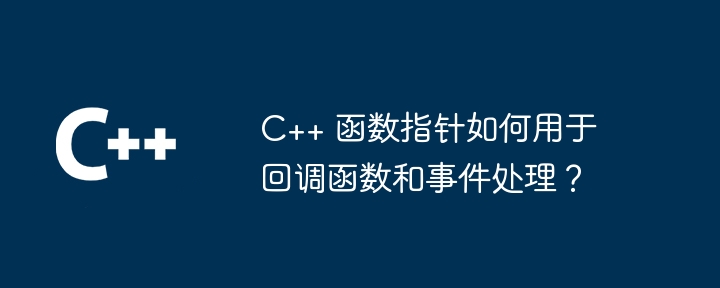
Function pointers are used in callback functions and event handling in C. By pointing to functions, they allow functions to pass their references to methods to other functions. The advantages of using function pointers include flexibility, scalability, code decoupling, reusability, and asynchronous communication.

C Function pointer: callback function and event handling
Introduction
Function A pointer is a special variable that points to a function. In C, function pointers are widely used for callback functions and event handling.
Syntax
Function pointers use type conversion operators (::) Syntax definition:
type (*function_pointer)(parameters);
For example:
int (*加法指针)(int, int);
Callback function
A callback function is a function that is passed to another function and will be called at a later point in time. Function pointers provide a way to allow functions to pass references to methods to other functions.
Example: Comparison function
// 比较函数
int 比较(const void *a, const void *b) {
return *(int *)a - *(int *)b;
}
// 使用函数指针调用比较函数
qsort(array, size, sizeof(int), 比较);Event handling
Event handling allows responding to user or system events. Function pointers are used to register event handlers, which fire when an event occurs.
Example: Window message handling
// 事件处理程序
LRESULT CALLBACK 窗体处理程序(HWND hwnd, UINT message, WPARAM wParam, LPARAM lParam) {
// ...
}
// 注册事件处理程序
SetWindowLongPtr(hwnd, GWLP_WNDPROC, (LONG_PTR)窗体处理程序);Advantages
The advantages of using function pointers include:
Practical case
Callback function: Thread pool
// 线程池工作者线程
void 线程池工作者(void *data) {
// 对 data 参数执行操作
}
// 使用回调函数创建线程池
ThreadPool 线程池(10, 线程池工作者);Event handling: File monitoring
// 文件监控回调
void 文件监控处理程序(const char *filename, DWORD action) {
// 对文件操作采取行动
}
// 使用函数指针注册文件监控处理程序
FindFirstChangeNotification(directory, FALSE, FILE_NOTIFY_CHANGE_LAST_WRITE, 文件监控处理程序);By using function pointers, you can easily create Flexible and extensible program that handles callback functions and events.
The above is the detailed content of How are C++ function pointers used for callback functions and event handling?. For more information, please follow other related articles on the PHP Chinese website!
 What are the differences between c++ and c language
What are the differences between c++ and c language
 Recommended learning order for c++ and python
Recommended learning order for c++ and python
 Cost-effectiveness analysis of learning python and c++
Cost-effectiveness analysis of learning python and c++
 Is c language the same as c++?
Is c language the same as c++?
 Which is better to learn first, c language or c++?
Which is better to learn first, c language or c++?
 The difference and connection between c language and c++
The difference and connection between c language and c++
 C++ software Chinese change tutorial
C++ software Chinese change tutorial
 Cost-effectiveness analysis of learning python, java and c++
Cost-effectiveness analysis of learning python, java and c++




